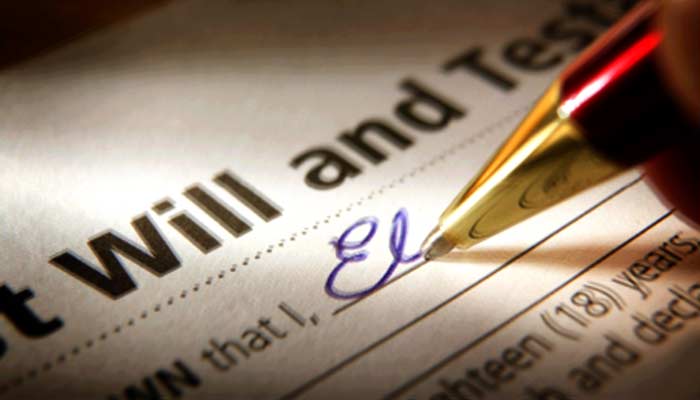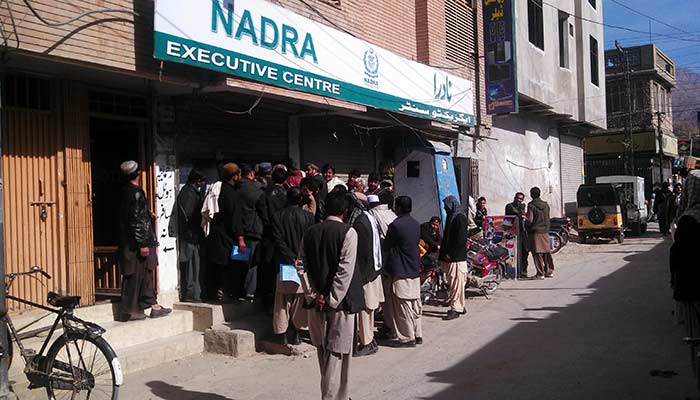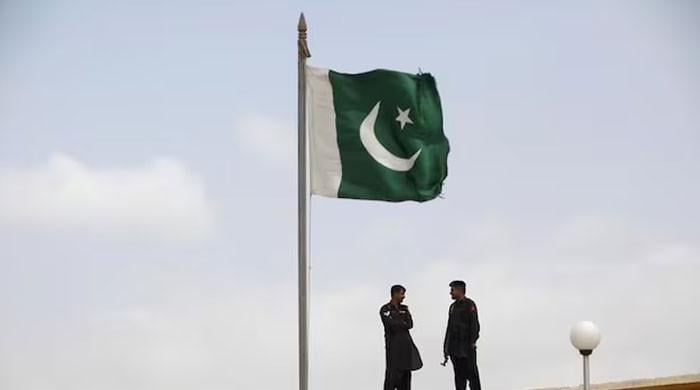The quagmire of Pakistan's succession laws
Syed Reza Ali writes on the legal pitfalls and delays that await an ordinary Pakistani with respect to succession laws, and what legislators can do to make it better
May 18, 2018

Imagine a not-atypical scenario in Pakistan. A man dies after a sudden illness leaving behind a widow, two sons and a daughter. After completing the requisite formalities of a burial, the grieving family focuses their attention on splitting the deceased’s assets. These may include bank accounts, shares, immovable property such as a house and a couple of vehicles. The family assume (rather naively) that the process of transferring these assets will be fairly cut and dried—secure a death certificate of the deceased, and have the property, bank accounts and shares assigned in their favour. Simple enough.
But, they are in for a rather rude shock.
When the family goes to a bank or a financial institution where the deceased had an account, they will be informed by the relevant official that the bank has frozen the deceased’s accounts and they will require a "Succession Certificate" to get the accounts unfrozen and access the funds. Similarly, a new buyer will refuse to purchase their father's vehicle unless its registration is transferred in the legal heir's name. To further complicate matters, lawyers will advise them to file lawsuits before competent courts for the transfer of movable and immovable assets. The cases filed will require them to give notice to the general public, which may result in other prospective legal heirs (perhaps from dad's previous indiscretions or crooks trying their luck to extort money or even estranged relatives) wanting a share of the pie. If all this isn’t enough to make one’s head spin, the court will require the family’s side to act as guarantors by providing collateral, which is usually title documents of property to be deposited in court. This is in order to secure the assets transferred to the family and indemnify the court, in case someone else challenges this transfer at a later stage.
Does the above seem like a procedural nightmare? Remarkably. Succession/inheritance proceedings in courts are actually considered one of the least painful in terms of delays or complexities. If there are no legal challenges by the general public to the cases filed by the family, such proceedings typically last a year, which is super swift bearing in mind the speediness of litigation in Pakistan. As a contrast, a property dispute that commences in the Civil Court in Pakistan and exhausts the appeal processes all the way to the Supreme Court will have a disposal rate that may typically take an eye-watering twenty-five years.
Like most things in Pakistan, this does not have to be this way.
Inheritance laws are enshrined under the Succession Act 1925, which was the colonial legislation promulgated to deal with the distribution of estates in United India. Post partition, the Act has undergone amendments to ensure compatibility with the Islamic law of inheritance. In this respect, the Act deals with complex issues of the distribution of the estate amongst lineal and collateral descendants, the procedural aspects of wills and bequests and the procedure for filing cases for the grant of succession certificates, the details of which are beyond the scope of this piece.

So what legal pitfalls await the ordinary person with respect to succession laws? Firstly, one needs to distinguish a gift and succession of property. So many well meanings elderly patriarchs/matriarchs confuse the two concepts. A gift of a property can be made to any person and is unfettered by any legal rules pertaining to inheritance. However, a gift can only be made in the lifetime of a person and is akin to a transfer of property. For example, A wants to gift his house to his favorite daughter and wishes to exclude his sons from any rights to the property. (For those dismissing this is as fiction specifically in our society, it happens more than you think). A gift is treated as a transfer of property under law just like a sale and involves duties and taxes paid to the Government for the transfer to be effectuated. If all formalities are completed, then the other legal heirs cannot challenge the gift and the daughter will become the owner of the property. This is different from when the property comes to the legal heirs upon the death of A. In this respect, the son’s rights in the property shall be double of that of the daughter or putting it simply, the daughter’s right shall be half of that of the son, under Islamic law. The widow’s rights shall be one-eighth in the property. Also, contrary to popular belief, the shares of the wife are the same under Sunni or Shia jurisprudence as they have been ordained in the Holy Quran.
Coming to the procedure for filing inheritance suits, an application for grant of a succession certificate is filed by the legal heirs of the deceased before a competent court (typically a civil court in Punjab or the High Court in Sindh). The application covers movable assets, such as bank accounts, shares, savings certificates etc. For transferring the deceased’s fixed assets such as immovable property, the legal heirs would need to file a separate legal application referred to as a Suit for Declaration before the civil court, which as the name implies, is a declaration to the public that they are the legal heirs and entitled to the deceased’s estate. Confusingly, vehicles are considered “immovable property” and have to be filed under the Suit for Declaration.
In both suits, the court will issue notices to the general public through newspapers for the purpose of inviting any objections. With respect to the Suit for Declaration, the court issues notices to regulators such as the Lahore Development Authority, or the Defence Housing Authority, depending upon the location of the property in question, to provide no-objection certificates for the transfer of the property to the legal heirs. Once this is done, the courts issue orders in both suits, approving the transfer, and all the requisite authorities are bound to honour the same and transfer the assets. The legal heirs are also required to be present in court to record evidence and furnish proof of their relation to the deceased.
What are the practical pitfalls of such legal proceedings? Basically, delays, delays, delays—the bane of the Pakistani legal system.
Whilst the Succession Certificate is expected to be issued within a period of six months, even accounting for adjournments, strikes, or judges on leave. The Suit for Declaration is a different beast altogether. The delays commonly emanate when officials of housing or development societies, required to give the green signal to the property, don’t bother to attend proceedings and courts are unwilling to decide the matter without their blessing to the transfer. The end result is a litany of adjournments or relisting of the case for later dates, much to the despair of the legal heirs. The proverbial cherry on top is that a typical civil court in Pakistan on any given day would be hearing in excess of 40 to 50 cases, hence any likelihood of swift justice being meted out is optimistic at best and delusional at worst.
The end conclusion is that such cases are dragged on for years, when they simply should not be, as they are not in nature of disputes of an adversarial nature. They simply pertain to the fulfillment of procedural formalities, which can literally be accomplished within one or two hearings.
It’s easy to pontificate on the shortcomings of the system: Can a viable solution be achieved? Here’s a thought.

The National Database Registration Authority (NADRA) manages the entire database of Pakistani citizens and is responsible for issuing CNICs, which encapsulates lineage and domicile. Parliament can legislate to empower NADRA for verifying applications of succession and issue succession certificates to the legal heirs. These certificates would then be prima facie, sufficient evidence for revenue authorities or financial institutions to transfer assets of the deceased without the need for their officials to attend court hearings.
Authorising NADRA to issue succession certificates shall empower an authority that already has all the requisite information regarding its citizens necessary to verify legal heirs and issue death certificates regarding the deceased. Significantly, such legislation shall free up courts from hearing such matters and concentrate on disposal of other cases. As far as the issue of any legal challenges by third parties is concerned, an independent tribunal/ombudsperson may be established, again through amendments in the NADRA Act, to adjudicate upon the same.
The above solution would facilitate legal heirs insofar that they would be saved from the inconvenience of running from pillar to post in various courts as well as forking out expensive legal fees for filing suits.
There is a larger lesson in all this. The common refrain echoed by all and sundry is that courts are overburdened and slothful. Yet it is the Parliament that is responsible for passing new legislation that takes the pressure off courts and creates specialised forums for dealing with specific matters. Insurance ombudspersons, banking courts, tax tribunals, all perform specialised functions on the basis of powers vested under law. Appropriate amendments to the laws governing NADRA would ensure an alternative forum for legal heirs looking for uncomplicated and swift relief.
It is easy to repeat clichés ad nauseam that justice delayed is justice denied. It is an eminently harder job to do something about such delays.
Ali is a barrister in Lahore. He tweets at @RezaAli1980
Note: The views expressed in the article are those of the author, and do not necessarily reflect the official policy or position of Geo News or the Jang Group.











